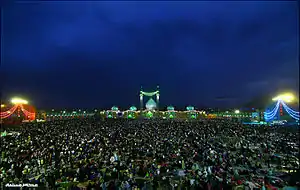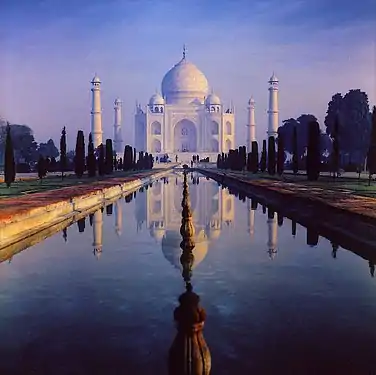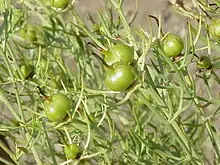Shab-e-barat
Shab-e-Barat , Barat Night, Cheragh e Brat (light) or Berat Kandili is a Muslim holiday, celebrated on the 15th night, the night between 14 & 15 of the month of Sha'ban, the eighth month of the Islamic calendar. Barat Night is preserved simultaneous with the Shia Mid-Sha'ban festival but origins of this festival is different from Mid-Sha'ban. Barat festival is commemorated by both Shia and Sunni Islam but Mid-Sha'ban is commemorates only by Shia to celebrate birth anniversary of 12 Imam Mahdi.Barat festival has a root in Persian Mehragan or cheragh Brat festival to tribute The souls of the dead. [1] Barat or Brat is regarded as a night when the fortunes of individuals for the coming year are decided and when Allah may forgive sinners. In many regions, this is also a night when prayers are arranged for forgiveness from Allah for one's deceased ancestors.[2] Additionally, Twelver Shia Muslims commemorate the birthday of Muhammad al-Mahdi on this date. [3][4]Salafi streams oppose the recognition of Mid-Sha'ban as exceptional for prayer.[5]
| Shab-e-barat | |
|---|---|
 | |
| Official name | Arabic: برات, romanized: the bright night |
| Observed by | Muslims |
| Type | Islamic |
| Observances | Respecting the death souls Forgiveness |
| Date | Night between 14 & 15 of Sha'ban, which is known as Mid-Sha'ban |
| Today |
Using tabular calculations |
 |
| Part of a series on |
| Islamic culture |
|---|
| Architecture |
| Art |
| Clothing |
| Holidays |
| Literature |
| Music |
| Theatre |
|
Description
Since the celebration of Barat festival and Shia Jashn e Mid-Sha'ban is held usually at the same time on the same day, in this article and similar articles the ceremonies of Barat and the ceremonies of Mid-Sha'ban had been mixed mistakenly so there should be distinction and separate the issues. The ways of holding these two celebrations are different. Because Brat is very old, its celebration is held in each region with different rituals and styles. but shia Jashn Mid-Sha'ban every where is the same. Jashn e Mid-Sha'ban Laylat al-Nisf Sha’ban in the Arab world, is a shia ceremony. but Barat is calledShab-e-Barat (شب برات) in India, Pakistan, Bangladesh, Afghanistan and Nepal in Iran it is called Cheragh Brat or the light or bright, Berat Kandili in Turkish; and Lejletul Berat in Bosnian. These names are translated as 'the night of records', 'the night of assignment' and 'the night of deliverance'. The observance involves a festive nightlong vigil with prayers; in most of the regions, this is a night when one's deceased ancestors are commemorated.
- more on Jashn e Mid-Sha'ban
Origins
According to a new studies by professor Eiichi Imoto and Dr. Mohammad Ajam Barat festival is not rooted in Islamic traditions but it has a root in the pre-Islamic religions in Middle East and Persia the roots is similar to the festivals like the Bon Festival the basic ceremony of Barat is the same. the way that people in East of Iran traditionally preserving the Barat is the same as the Bon Festival in Buddhism and Pitri Paksha in Hinduism and a Zoroastrian festival it seems all have the same roots. .according to this study the Persian word Brat(bright) is different from the Arabic word Baraat.in khorasan people call the Barat as the Cheragh (light) Brat, means bright or light festival. Al-Biruni (973 – after 1050) had wrote about Brat as: "Brat is a festival from 12 to 15 of lunar month that in Arabic it is AL Baiz meaning bright and barat also is called al Ceqe meaning Cheque. In some Iranian cities to celebrate this festival people gathering in the cemeteries firing Peganum harmala, a holy plant in old Persia and put the fire in a corner of the tombs and pouring some salt on the fire and reading a poem saying: The Peganum harmala is Bitter and salt is salty so The jealous eye of the enemy be blind."[1]
Shab-e-Barat also considers as the Night of forgiveness or Day of Atonement.[6] Muslims observe Mid-Sha'ban as a night of worship and salvation. Scholars including Imam Shafii, Imam Nawawi, Imam Ghazzali and Imam Suyuti have declared praying on the night of mid shaban as acceptable.
In his Majmu', Imam Nawawi quoted Imam al-Shafi`i's Kitab al-Umm that there are five nights when dua (prayer) is answered, one of them being the night of the 15th of Sha`ban.
Etymology
The festival of Shab-e-Barat is celebrated with pomp and enthusiasm by Muslims, mainly in South Asia. For, Muslims believe that on the night of Shab-e-Barat, God writes the destinies of all men and women for the coming year by taking into account the deeds committed by them in the past. It is of high value to Sunni Muslims[6] It is considered one of the holiest nights on the Islamic Calendar.[7]
The 15th of Sha'ban goes by several names, depending on the country in which it is observed. Most can be categorised into two general meanings:
- Mid-Sha'ban or Half of Sha'ban. Named after the day's chronological position in the eighth month of the Islamic calendar:
- Nim Sha'ban (Persian: نيم شعبان)
- Bara'at Night. Bara'at is an Arabic noun which is roughly translated to English as either innocence, records, assignment, deliverance or salvation.
Significance and traditions
To pray for the dead and asking the God for forgiveness of the Dead is a common ceremony in all the cities which holding Barat ceremonies. According to a hadith, Prophet Muhammad, went in this night to the graveyard of Baqi' where he prayed for the Muslims buried there. On this basis, some of the cleric hold it as advisable in this night to go to the graveyard of the Muslims and recite part of the Qur'an, and pray for the dead.
According to some Sunni Islam tradition, this night is called Shab-e-Bara'at ("the night of freedom") because Allah frees His sinful servants who were destined for Hell. A person's life in the coming year, his sustenance, and whether or not they will have the opportunity to perform Hajj (pilgrimage) shall be decided on this night. The names of the souls of all those who are born and of all those who are to depart from this world are determined. One's actions are raised and sustenance sent down.[6] According to sources it is said that on this night the Doors of Mercy and Forgiveness are opened wide, But According to sources, there is some special "Not Dos" for this night; For example, One who creates disunity among two Muslims & The person who unjustly takes away the right and property of another Muslim and has not yet rectified himself, these persons are not shown Mercy on this auspicious Night.[8][9]
Customs in different countries
This occasion is celebrated with great reverence, pomp and gaiety all over South Asia, including India, Pakistan, Bangladesh,[10] Sri Lanka, Azerbaijan and Turkey and Central Asia including Uzbekistan, Tajikistan, Kazakhstan, Turkmenistan and Kirghistan. In the Arab world the festival is celebrated with enthusiasm by Arabs with Sufi heritage, and Shias. The Salafi Arabs do not celebrate this holiday.
Iran


Brat festival in khorasan especially in the Greater Khorasan ,Kurdistan and some part of Iran is one of the most important festival for the respecting soul of the dead. people in every cities have their own customs but the common costumes is to prepare sweets and candy with dates (Halva) and Date palm gather in graveyard of the cemeteries' and cleaning the tombs and putting the dishes of sweets and candy pot on the tombs and offering to the people to eat, pray and fire candle, Turn on the lights (cherag) .in some Iranian cities to celebrate this festival people gathering in the cemeteries firing Peganum harmala or haoma a holy plant in old Persia and put the fire in a corner of the tombs and pouring some salt on the fire and reading a poem saying: the Peganum harmala is Bitter and salt is salty so The jealous eye of the enemy be blind."[1] In Iran the Barat festival is celebrated in 2 different ceremonies brat in some part of Iran starts from 13, but end in 15th month in 15 all streets in the cities will be lighten to commemorate the birth date of Imam Al Mahdi, the last Imam of Shia .[6]
Iraq
In Iraq, people give children candies as they walk around their neighborhoods. Sunni Muslims in Iraqi Kurdistan and Afghanistan celebrate this holiday 15 days before Ramadan. So Muslims in Indonesia do communal zikr in mosques followed by a lecture (ceramah) led by an ustadz or otherwise known in Java and Madura as a kyai. This tradition is rarely followed in Indonesia, but it is widely followed in Aceh, West Sumatra and South Kalimantan. In the South Asia, Muslims make sweets (especially Halwa or Zarda) to be given to the neighbors and the poor on the evening prior to the 15th of Sha’ban.[8]
New Delhi
In New Delhi Barat night is the most important night. and the city become so crowded and there is traffic jam so every year the police usually announces in advance a special traffic rule for the night of barat.
Pakistan
Pakistani people also have some special ceremony for barat.
Turkey
Berat Kandili, (Berâet Kandili), are considered sacred. the ceremony became popular since The Ottoman Empire Selim. It was named as oil lamp after burning lamps in minarets since Selim.
Related Hadiths
Doubtlessly, Allah surrounds everything on the fifteenth night of Shaban with his mercy. He forgives all of His creatures except mushriks (polytheists) and those whose hearts are full of hatred or enmity of others. Allah, the Exalted, forgives all Muslims on that night except soothsayers, magicians, people who are full of hatred, alcoholics, people who harm their parents and those who insist on committing fornication. Al-Targhib wa al-Tarhib, 2:118.[11]
‘Aisha is reported to have said that Muhammad said, "This is the middle night of Sha’ban. Allah frees in it a large number of the people from the Hellfire, more than the number of the hair growing on the sheep of the tribe, Kalb. But He does not even look at a person who associates partners with Allah, or at a person who nourishes malice in his heart (against another muslim), or at a person who cuts off the ties of womb-relations, or at a man who leaves his clothes extending beyond his ankles (as a sign of pride), or at a person who disobeys his parents, or at a person who has a habit of drinking wine."[12]
Is there no one asking forgiveness that I may forgive them? Is there no one asking sustenance that I may grant them sustenance? Is there no one under trial that I may relieve them? It goes on like that until dawn rises. Hadith: Ibn Majah, Iqama, 191.[11]
The hadith by Imam Ibn Hajr Haythmi, states, Narrated by Muadh bin Jabal (RA) from Prophet (salallahu alaihi wasalam) who said: Allah turns towards his creation in the Night of Mid-Shabaan and He forgives all of them except for a Mushrik and one who hates other people.[13] Classed as Sahih by Salafi scholar Nasiruddin Albani in his silsilah Al-Sahihah. Another hadith in Musnad Ahmed hanbal "Allah looks at His creation during the night of the 15th of Sha'ban and He forgives His servants except two- one intent on hatred (mushanin) and a murderer (qatilu nafs). Classed Hassan by Albani in his silsilah Al-Sahihah.
Hadith classed sahih by Ibn Hibban "Allah looks at His creation in the night of mid-Sha`ban and He forgives all His creation except for a mushrik (idolater) or a mushahin (one bent on hatred).[14] Also reported by Tabrani[15] and Al Bayhaqi[16]
The Prophet said: ‘On the middle night of Shaban, Allah most high descends to the lowest heaven and remits more sins than the hair of the goats of Banu Kalb.’[17]"
According to Muadh ibn Jabal, Allah's Messenger said: "Allah Almighty looks upon all those created by Him in the middle night of Shaban and forgives all those created by Him. Excepted is the one who associates partners with Him, or the one who has malice in his heart."
See also
- shiaMid-Sha'ban festival
- Baraat
- Bon Festival
- Pitri Paksha
- Zoroastrian festival .
- Sufism
References
- Dr. Ajam. "Brat and its roots".
- Jamal J. Elias (1999). Islam: Religions of the world. Psychology Press. ISBN 978-0-415-21165-9.
... Laylat al-bara'a ... fortune for the coming year is popularly believed to be registered in Heaven ... prayer vigils and by feasting and illumination ... oblations are made in the name of deceased ancestors ...
- "The great Shia scholar, Abu Ja'far Mohammad ibn Uthman al-Amri – Imam Reza (A.S.) Network". imamreza.net. Archived from the original on 29 September 2017.
- The Return of al-Mahdi. P11
- Muhammad Umar Memon, Aḥmad ibn ʻAbd al-Ḥalīm Ibn Taymīyah (1976), Ibn Taimīya's struggle against popular religion: with an annotated translation of his Kitāb iqtiḍāʾ aṣ-ṣirāṭ al-mustaquīm mukhālafat aṣḥāb al-jaḥīm, Mouton, 1976, ISBN 978-90-279-7591-1,
... among the Salaf as well as those among the khalaf, however, reject any excellence for the night in question and challenge the authenticity ... Marking mid-Sha'ban by fasting is without foundation, nay marking it is disapproved of. Likewise, celebrating it by preparing ...
- "Live Chennai: Shab-E-Barat – Festivals of India – Festivals in India – Muslim Festivals – Ramzan – Id-ul-fitr – Bakrid, Eid Mubarak". livechennai.com.
- "Lailatul Barat". wincalendar.com.
- "About: Shab-e-barat (شب برات)". Events in Karachi – Latest Event Updates- Articles – About Karachi.
- Yassir Hussain. "Islamic Centre". islamiccentre.org.
- "Bangladesh to celebrate Shab-e-Barat on Apr 9".
- "Laylatul Barat (Night of Barat)". Questions On Islam. questionsonislam.com. Retrieved 1 June 2015.
- Baihaqi, Al-Targhib wa al-Tarhib.
- Az Zawaid 12860.
- Sahih Ibn Hibban 7/470.
- Al muajamul Kabir 20/108-9.
- Shubul Iman 2/288.
- Jami Tirmidhi.
External links
- Shab-e-Baraat: Introduction and guidance on special prayers for the night. (Includes Salaatul Tasbih)
- Origin of Cherag (light) e Brat in khorasan
| Look up Bharat in Wiktionary, the free dictionary. |